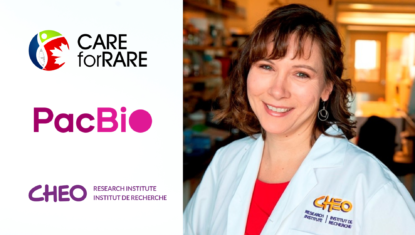28/02/2022
Ottawa, Ontario — Monday February 28, 2022

Over one million Canadians are impacted by rare genetic diseases, and over a third of these remain unsolved. For some families, this has led to decades-long diagnostic odysseys to find the cause of their genetic disorder. In addition to physical tolls of the disorders, not having an answer can be extremely frustrating and upsetting. In recognition of Rare Disease Day on Monday, February 28, 2022, the CHEO Research Institute is highlighting the collaboration between Pacific Biosciences (PacBio) and Care4Rare to help solve the most complex, unexplained rare disease cases within Canada. Thanks to their partnership, some of these families will be able to get the answers they seek.
Care4Rare is a pan-Canadian collaborative team of clinicians, bioinformaticians, scientists, and researchers, focused on improving the care of rare disease patients in Canada and around the world. Led out of CHEO Research Institute in Ottawa, Canada, affiliated with the University of Ottawa, Care4Rare includes 21 academic sites across the country, and is recognized internationally as a pioneer in the field of genomics and personalized medicine.
Care4Rare is one of many institutions using PacBio’s HiFi Sequencing in the research setting to identify rare disease mechanisms, in the hopes of integration in clinical settings. With accuracy >99.9% and long read lengths up to 25 kb, HiFi sequencing allows scientists to find causative pathogenic variants and identify novel disease-associated genes by addressing challenges such as phasing of variants, achieving even sequence coverage, and the ability to sequence repetitive regions of the genome.
Institutions have started to apply the comprehensive long-read technology to cases where the causes of genetic conditions impacting generations of families have remained unsolved, despite extensive exome, genome and RNA sequencing.
In a recent interview with PacBio, Dr. Kym Boycott, MD, PhD, Senior Scientist, CHEO Research Institute and Chair of the Department of Genetics at CHEO, discussed the interim results of the partnership:
Dr. Boycott notes that the results so far have been extremely promising.
“HiFi Sequencing has begun to show its early successes in identifying rare disease mechanisms that are intractable to the other available technologies at this time,” said Dr. Boycott. “It has nicely been used to find complex genomic rearrangements, insertions and deletions that are otherwise being missed.”
Dr. Boycott envisions a future in which families can consult a clinical geneticist and have access to a variety of technologies that can provide the most efficient answers in the shortest time frame.
She also notes that HiFi Sequencing shows great utility in shedding light on some of the most difficult-to-solve rare disease cases, as it can reveal genetic changes hidden to other technologies.
Care4Rare’s ultimate goal is to more than double the capacity to diagnose the rare diseases that impact approximately one million Canadians, and improve care for patients by tailoring management to their underlying condition.
“Care4Rare launched the C4R-SOLVE project in 2018 to work to identify the genetic cause of the most difficult to solve rare diseases and to facilitate the introduction of genome-based clinical diagnostic tests into the diagnostic care pathway for all Canadians with a suspected rare disease,” said Dr. Boycott. “Over the years we have used many technologies with great success to provide answers for many families, but there still remain some families for which we are unable to get an answer because their genetic change is hidden to the currently available technologies. We know that PacBio’s HiFi sequencing will allow us to explore new areas of the genome to find answers for these families, thereby advancing diagnostic care as well as providing insights into new areas of biology.”
PacBio is eager to continue working with Care4Rare to help families grappling with a rare disease get answers.
“Our collaboration with Care4Rare is exciting for all of us who want to help find answers in rare disease,” said Jonas Korlach, PhD, Chief Scientific Officer at PacBio. “We believe that high-quality, long read WGS is the future of rare disease research, and we believe studies like this will make a meaningful impact on the medical community’s ability to make that future a reality sooner.”
To learn more about the important work of Care4Rare visit care4rare.ca. Did you know:
- There are about 7,000 rare genetic diseases (RDs) in Canada that impact more than one million Canadians and their families:
- 2/3 of these diseases cause significant disability;
- 3/4 affect children;
- more than 1/2 lead to early death;
- almost all have no targeted treatment
- Further, more than 1/3 of these diseases remain unsolved (their genetic cause is unknown).
To support the work of Care4Rare visit the CHEO Foundation at cheofoundation.com.
To learn more about how PacBio HiFi sequencing is helping advance our understanding of rare disease:
- Watch on-demand presentations from our Virtual Rare Disease Week event
- Learn how Whole Genome Sequencing helps us understand rare diseases in our Sequencing 101 series
- Visit our rare disease resource page
